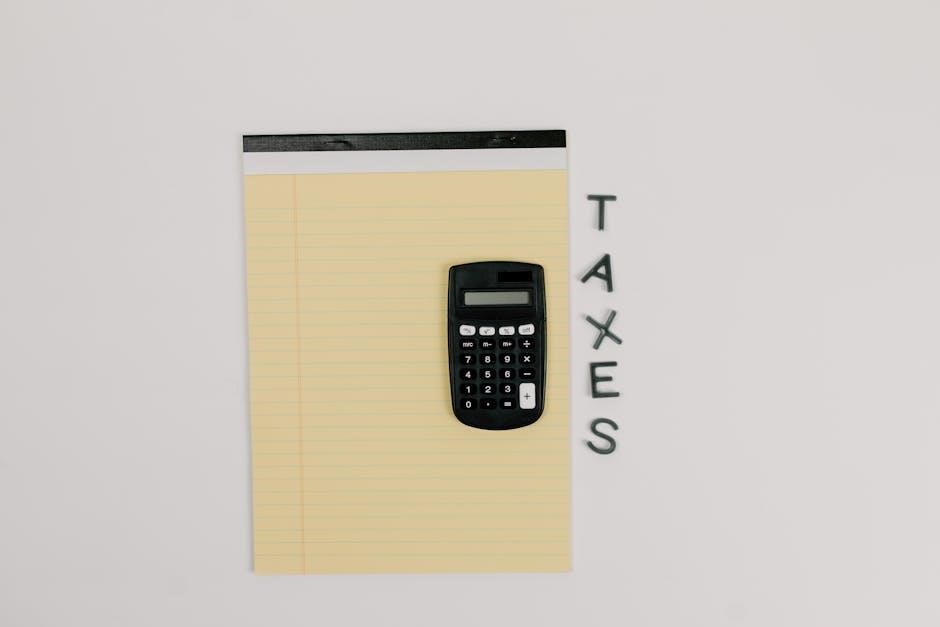Year 3 Maths Booklet PDF: A Comprehensive Guide
This guide provides a detailed overview of Year 3 maths topics, including multiplication, fractions, and geometry. It offers downloadable PDF resources from Cazoom Maths and White Rose Maths, designed to support skill development and reinforce classroom learning. Perfect for teachers and parents seeking structured, engaging maths activities for children.
Year 3 maths booklets are essential resources for children aged 7-8, covering key curriculum topics like multiplication, fractions, and measurement. Designed to support classroom learning, these booklets provide structured activities that promote skill development and confidence. With a focus on regular practice, they include a progression from simple to challenging questions, helping students build a strong foundation in maths. Available as downloadable PDFs, these booklets are perfect for teachers, parents, and homeschoolers seeking engaging and effective learning tools.
Key Topics Covered in Year 3 Maths Booklets
Year 3 maths booklets cover a wide range of essential topics, including multiplication, division, addition, and subtraction. They also focus on fractions, decimals, time, and measurement, as well as geometry and shapes. These resources are designed to build foundational maths skills through structured activities and real-world applications. By addressing these key areas, the booklets provide a comprehensive learning experience, helping students develop problem-solving abilities and math fluency.
- Multiplication and division facts
- Written methods for addition and subtraction
- Understanding fractions and decimals
- Time and measurement skills
- Geometry and shape recognition
Multiplication and Division
Year 3 maths booklets emphasize multiplication and division as foundational skills. Students learn multiplication tables up to 5×5 and understand multiplication as repeated addition. Division is introduced as the inverse of multiplication, with exercises on sharing and grouping objects. Worksheets include problems like 3, 4, and 8 Multiplication Challenges to build fluency. These activities help pupils apply their knowledge to solve real-world problems, fostering problem-solving and logical thinking. Regular practice with these operations strengthens numerical understanding and prepares students for more complex maths concepts.
- Learning multiplication tables up to 5×5
- Understanding division as the inverse of multiplication
- Practicing sharing and grouping activities
- Solving multiplication and division word problems
Addition and Subtraction
Year 3 maths booklets focus on refining addition and subtraction skills, introducing more complex problems. Students practice adding and subtracting three-digit numbers, understanding place value, and solving word problems. Worksheets include exercises on mental maths strategies, such as rounding and compensating, to improve speed and accuracy. Activities also cover column addition and subtraction, ensuring pupils grasp formal written methods. These exercises build a strong foundation for more advanced arithmetic operations in later years.
- Practicing three-digit addition and subtraction
- Mastering column addition and subtraction
- Solving word problems involving money and measures
- Developing mental maths strategies
Fractions and Decimals
Year 3 maths booklets introduce fractions and decimals, helping students understand basic concepts. Activities focus on identifying and creating fractions using shapes and objects, while decimals are explored through money and measurement. Worksheets include comparing fractions, adding simple fractions with the same denominator, and converting between fractions and decimals. These exercises help pupils grasp foundational skills, preparing them for more complex operations in future years.
- Identifying and creating simple fractions
- Understanding halves, quarters, and thirds
- Exploring decimals through real-world examples
- Comparing and converting fractions and decimals
Time and Measurement
Year 3 maths booklets focus on time and measurement skills, helping students tell time on analog clocks, understand units of time, and convert units like days to weeks or months. Measurement activities include comparing lengths, masses, and volumes using rulers, scales, and measuring cups. Worksheets also explore reading timetables and calculating durations, providing practical applications for real-world scenarios; These exercises build accuracy and confidence in essential everyday maths skills.
- Telling time on analog clocks
- Understanding units of time
- Comparing lengths, masses, and volumes
- Reading timetables and calculating durations

Geometry and Shapes
Year 3 maths booklets introduce students to basic geometry and shape recognition. Activities focus on identifying and naming 2D and 3D shapes, understanding their properties, and exploring symmetry. Worksheets include tasks like sorting shapes by features, counting sides, and identifying angles. These exercises help develop spatial awareness and foundational geometry skills, essential for more complex concepts in later years. Interactive activities encourage creativity and practical application of shape knowledge in real-world contexts.
- Recognizing 2D and 3D shapes
- Understanding shape properties and symmetry
- Sorting and categorizing shapes
- Applying shape knowledge in real-world scenarios
Benefits of Using Year 3 Maths Worksheets
Year 3 maths worksheets provide consistent practice, helping students master foundational skills. They gradually increase in difficulty, ensuring a smooth progression from basic to advanced concepts. Regular use enhances problem-solving abilities and logical reasoning. Worksheets also reinforce classroom lessons, making learning more effective. By completing these exercises, students build confidence and fluency in maths, preparing them for future challenges. They are an invaluable tool for both teachers and parents seeking to support educational development.
- Consistent practice for skill mastery
- Progression from easy to challenging questions
- Enhanced problem-solving and logical thinking
- Reinforcement of classroom learning
Regular Practice and Skill Development
Regular use of Year 3 maths worksheets ensures consistent practice, helping students build a strong foundation in numerical skills. Worksheets introduce topics gradually, starting with simple problems and progressing to more complex ones. This structured approach allows students to master concepts like multiplication tables, fractions, and basic geometry. Regular practice also improves speed and accuracy, fostering confidence and a deeper understanding of maths principles. It equips students with the skills needed for more advanced maths in the future.
- Builds a strong numerical foundation
- Introduces concepts gradually
- Improves speed and accuracy
Progression from Easy to Hard Questions
Year 3 maths booklets are designed to gradually increase in difficulty, starting with simple problems and advancing to more challenging ones. This progression helps students master basic concepts before moving on to complex topics. Worksheets begin with foundational skills like multiplication facts and simple fractions, then introduce more advanced exercises such as multi-step word problems and mental maths challenges. This structured approach ensures a smooth learning curve, building confidence and preparing students for higher-level maths.
- Starts with basic concepts
- Introduces advanced exercises
- Ensures a smooth learning curve
Enhancing Problem-Solving and Logical Skills
Year 3 maths booklets are packed with activities that foster critical thinking and logical reasoning. Through puzzles, word problems, and interactive exercises, students learn to approach challenges methodically. These resources encourage children to break down problems, analyze data, and draw conclusions. By solving real-world scenarios, such as measuring ingredients for a recipe or calculating travel times, students develop practical maths skills that enhance their problem-solving abilities and logical thinking.
- Puzzles and word problems
- Interactive exercises
- Real-world applications
Reinforcement of Classroom Learning
Year 3 maths booklets are designed to complement classroom instruction, offering additional practice on topics like multiplication, subtraction, and fractions. They align with curriculum goals, reinforcing concepts taught in school. With structured exercises and real-world applications, these resources help students apply classroom knowledge confidently. Regular use of these booklets ensures a strong foundation, bridging gaps and solidifying understanding.
- Aligned with curriculum topics
- Complements classroom instruction
- Structured exercises for practice
- Real-world applications included
How to Use Year 3 Maths Booklets Effectively
To maximise the benefits of Year 3 maths booklets, set clear goals for each session, ensuring alignment with your child’s learning objectives. Allocate specific time slots for practice, maintaining a balanced pace to avoid overwhelm. Incorporate visual aids like charts or manipulatives to enhance understanding. Regularly review mistakes, providing constructive feedback to help refine skills. This structured approach fosters consistency, confidence, and a deeper grasp of mathematical concepts.

- Set clear, achievable goals
- Allocate specific practice times
- Use visual aids for clarity
- Review and discuss errors
Setting Goals for Each Session
Setting specific goals for each maths session helps maintain focus and direction. Identify key topics like multiplication or fractions, and outline what your child should achieve by the session’s end. Break larger objectives into smaller, manageable tasks to build confidence and mastery. Align goals with the curriculum to ensure comprehensive skill development. Regular goal-setting fosters a sense of accomplishment and encourages consistent progress in maths.
Timing and Pacing Activities

Timing and pacing activities are crucial for effective maths practice. Allocate specific time slots for each task to maintain focus and avoid fatigue. Start with shorter intervals for younger children and gradually increase as their concentration improves. Use timers or clocks to help them manage time effectively. Ensure a balanced mix of questions, progressing from simple to complex. Incorporate short breaks to refresh their minds and maintain engagement. Consistent pacing helps build routine and improves overall maths performance. Vary activities to keep sessions dynamic and interesting.
Incorporating Visual Aids
Incorporating visual aids into Year 3 maths booklets enhances understanding and engagement. Use diagrams, charts, and images to illustrate concepts like fractions, geometry, and time. Visual representations of multiplication tables, number lines, and shapes help students grasp abstract ideas. Include pictograms for data handling and bar models for problem-solving. Colourful illustrations and real-world images make maths relatable and fun. Interactive visuals, such as movable shapes or counters, can also be included to encourage hands-on learning and deeper comprehension of key maths topics.
Reviewing Mistakes and Feedback
Reviewing mistakes and providing feedback is crucial for learning. Year 3 maths booklets often include spaces for corrections, allowing students to identify errors and understand where they went wrong. Teachers or parents can offer constructive feedback, guiding students on how to improve. Many resources, like Cazoom Maths and White Rose Maths, include answer keys and tips for addressing common misconceptions. Regular review helps build confidence and ensures students master concepts before moving forward. Feedback loops encourage a growth mindset, turning mistakes into valuable learning opportunities. This approach fosters resilience and a deeper understanding of maths skills.
Free Year 3 Maths Resources Available Online

Access a variety of free Year 3 maths resources online to support learning. Websites like Cazoom Maths Worksheets and White Rose Maths Resources offer downloadable PDFs covering topics such as multiplication, fractions, and geometry. These resources are designed to align with the curriculum and provide engaging activities for students. Many include answer keys and are printable, making them ideal for both classroom use and home learning. Utilize these resources to supplement lessons and reinforce maths skills effectively.

Cazoom Maths Worksheets
Cazoom Maths Worksheets offer a wide range of Year 3 maths resources in PDF format, covering topics like multiplication, fractions, and time. These curriculum-aligned worksheets are designed to support skill development through structured exercises. They include activities such as multiplication facts, subtracting fractions, and bar charts, helping students build confidence. With a variety of exercises, Cazoom Maths Worksheets are ideal for homework, classroom activities, or independent practice, catering to different learning needs and styles. Their resources are free to download and easy to use.
White Rose Maths Resources
White Rose Maths Resources provide comprehensive support for Year 3 students, offering detailed lesson plans and worksheets in PDF format. Covering topics like measuring mass, fractions, and 3-digit addition, these resources align with the curriculum and cater to various learning needs. They include structured exercises and alternative plans, making them ideal for classroom activities or home learning. Free to download, White Rose Maths Resources are a valuable tool for teachers and parents seeking to reinforce maths concepts effectively.
Interactive Maths Activities for Year 3
Engage Year 3 students with interactive maths activities that combine learning and fun. Worksheets with real-world applications help students see the practical side of maths, while games and puzzles enhance problem-solving skills. Interactive PDFs and online tools allow for dynamic learning experiences. These activities make maths enjoyable and accessible, encouraging children to explore concepts creatively while building confidence and fluency in their skills.
Worksheets with Real-World Applications
Worksheets with real-world applications make maths relatable and exciting for Year 3 students. These resources incorporate practical scenarios, such as measuring ingredients for a recipe or calculating costs while shopping. By connecting maths to everyday life, students develop a deeper understanding of how mathematical concepts are used outside the classroom. This approach fosters critical thinking and prepares children for real-life problem-solving, making learning both meaningful and enjoyable.
Games and Puzzles for Engaged Learning
Games and puzzles are excellent tools for engaging Year 3 students in maths learning. They transform complex concepts into enjoyable activities, fostering a positive attitude towards maths. Interactive games like maths bingo and puzzle-based worksheets challenge students to think critically and develop problem-solving skills. These resources are widely available, with platforms like Cazoom Maths and White Rose Maths offering free, downloadable content. Incorporating such activities enhances learning experiences, making maths both fun and effective for young learners.
Assessment and Tracking Progress
Assessment is crucial for monitoring Year 3 students’ maths progress. Informal quizzes and tests within maths booklets help identify strengths and areas needing improvement. Regular tracking allows teachers and parents to observe growth over time, ensuring tailored support. These resources provide clear benchmarks, enabling effective feedback and targeted practice. By incorporating assessment tools, Year 3 maths booklets offer a comprehensive way to evaluate learning and guide future instruction, helping students achieve maths proficiency.
Informal Quizzes and Tests
Informal quizzes and tests within Year 3 maths booklets serve as essential tools for assessing students’ understanding. These short evaluations cover various topics like multiplication, fractions, and geometry, ensuring a well-rounded assessment. Quizzes are designed to be engaging, reducing anxiety and making learning fun. They help identify gaps in knowledge, allowing for immediate intervention. Regular testing also builds confidence and fluency, preparing students for more formal assessments. By integrating these quizzes, maths booklets provide a seamless way to monitor progress and celebrate achievements.
Tracking Progress Over Time
Year 3 maths booklets include features that enable tracking of a child’s progress over time. With built-in progress trackers and space for feedback, these resources help parents and teachers monitor improvement. Regular use of the booklets reveals growth in maths skills, such as multiplication fluency and problem-solving abilities. Visual charts and review sections allow for easy identification of strengths and areas needing extra practice. This longitudinal approach ensures tailored support, fostering confidence and continuous development in maths.
Additional Maths Resources for Year 3
Beyond traditional worksheets, online learning platforms like Khan Academy and IXL offer interactive Year 3 maths lessons. Educational apps such as Mathletics and Duolingo Maths provide engaging, gamified exercises. These resources supplement booklets by offering personalized learning paths and real-time feedback. They cater to diverse learning styles, making maths practice enjoyable and effective; These tools are ideal for reinforcing concepts at home or in the classroom, ensuring a well-rounded maths education for Year 3 students.
Online Learning Platforms

Online learning platforms like Khan Academy and IXL offer comprehensive Year 3 maths resources. These platforms provide interactive lessons, practice exercises, and progress tracking. They cover topics such as multiplication, fractions, and geometry, aligning with the curriculum. Interactive activities and real-time feedback make learning engaging. Many platforms are free or low-cost, making them accessible for home use. They complement maths booklets by offering personalized learning paths tailored to individual needs, ensuring a holistic educational experience for Year 3 students.
